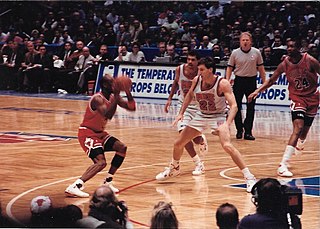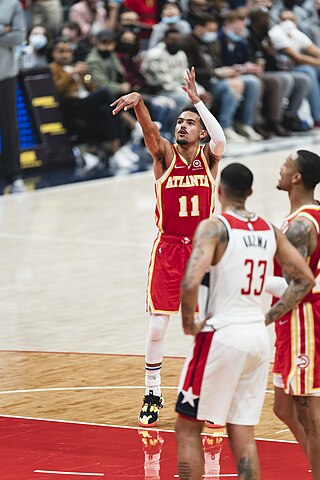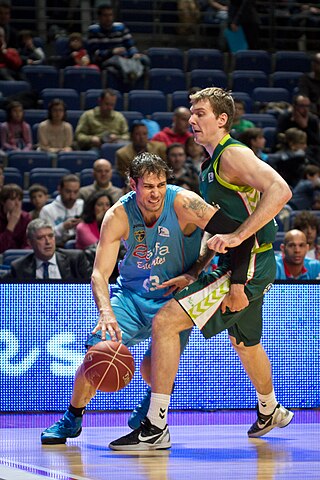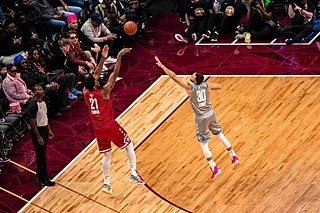
Basketball is a team sport in which two teams, most commonly of five players each, opposing one another on a rectangular court, compete with the primary objective of shooting a basketball through the defender's hoop, while preventing the opposing team from shooting through their own hoop. A field goal is worth two points, unless made from behind the three-point line, when it is worth three. After a foul, timed play stops and the player fouled or designated to shoot a technical foul is given one, two or three one-point free throws. The team with the most points at the end of the game wins, but if regulation play expires with the score tied, an additional period of play (overtime) is mandated.

In basketball, the basketball court is the playing surface, consisting of a rectangular floor, with baskets at each end. Indoor basketball courts are almost always made of polished wood, usually maple, with 3.048 meters (10 ft)-high rims on each basket. Outdoor surfaces are generally made from standard paving materials such as concrete or asphalt. International competitions may use glass basketball courts.
In basketball, a technical foul is any infraction of the rules penalized as a foul which does not involve physical contact during the course of play between opposing players on the court, or is a foul by a non-player. The most common technical foul is for unsportsmanlike conduct. Technical fouls can be assessed against players, bench personnel, the entire team, or even the crowd. These fouls, and their penalties, are more serious than a personal foul, but not necessarily as serious as a flagrant foul.

A shot clock is a countdown timer used in a variety of games and sports, indicating a set amount of time that a team may possess the object of play before attempting to score a goal. Shot clocks are used in several sports including basketball, water polo, canoe polo, lacrosse, poker, ringette, korfball, tennis, ten-pin bowling, and various cue sports. It is analogous with the play clock used in American and Canadian football, and the pitch clock used in baseball. This article deals chiefly with the shot clock used in basketball.

In basketball, free throws or foul shots are unopposed attempts to score points by shooting from behind the free-throw line, a line situated at the end of the restricted area. Free throws are generally awarded after a foul on the shooter by the opposing team, analogous to penalty shots in other team sports. Free throws are also awarded in other situations, including technical fouls, and when the fouling team has entered the bonus/penalty situation. Also, depending on the situation, a player may be awarded between one and three free throws. Each successful free throw is worth one point.

In basketball, a personal foul is a breach of the rules that concerns illegal personal contact with an opponent. It is the most common type of foul in basketball. A player fouls out on reaching a limit on personal fouls for the game and is disqualified from participation in the remainder of the game.

Streetball is a variation of basketball, typically played on outdoor courts and featuring significantly less formal structure and enforcement of the game's rules. As such, its format is more conducive to allowing players to publicly showcase their own individual skills. Streetball may also refer to other urban sports played on asphalt. It is particularly popular and important in New York City and Los Angeles, though its popularity has spread across the United States due to the game's adaptability.

The rules of basketball are the rules and regulations that govern the play, officiating, equipment and procedures of basketball. While many of the basic rules are uniform throughout the world, variations do exist. Most leagues or governing bodies in North America, the most important of which are the National Basketball Association and NCAA, formulate their own rules. In addition, the Technical Commission of the International Basketball Federation (FIBA) determines rules for international play; most leagues outside North America use the complete FIBA ruleset.

A three-point field goal is a field goal in a basketball game made from beyond the three-point line, a designated arc surrounding the basket. A successful attempt is worth three points, in contrast to the two points awarded for field goals made within the three-point line and the one point for each made free throw.

In basketball, a flagrant foul is a personal foul that involves excessive or violent contact that could injure the fouled player. A flagrant foul may be unintentional or purposeful; the latter type is also called an "intentional foul" in the National Basketball Association (NBA). However, not all intentional fouls are flagrant fouls, as it is an accepted strategy to intentionally commit a foul in order to regain possession of the ball while minimizing how much time elapses on the game clock.

This glossary of basketball terms is a list of definitions of terms used in the game of basketball. Like any other major sport, basketball features its own extensive vocabulary of unique words and phrases used by players, coaches, sports journalists, commentators, and fans.
In basketball, a three-point play is usually achieved by scoring a two-point field goal, being fouled in the act of shooting, and scoring one point on the subsequent free throw. Before the three-point field goal was created in the 1960s for professional basketball and 1980s for collegiate basketball, it was the only way to score three points on a single possession. It is sometimes called an old-fashioned three-point play to distinguish from the later three-point shot. And one is also sometimes used to refer to the extra free throw after a two-point basket.
Variations of basketball are games or activities based on, or similar in origin to, the game of basketball, in which the player utilizes common basketball skills. Some are essentially identical to basketball, with only minor rules changes, while others are more distant and arguably not simple variations but distinct games. Other variations include children's games, contests or activities intended to help the player practice or reinforce skills, which may or may not have a competitive aspect. Most of the variations are played in informal settings, without the presence of referees or other officials and sometimes without strict adherence to official game rules.

The key, officially referred to as the free throw lane by the National Basketball Association (NBA), the National Collegiate Athletic Association (NCAA), the National Association of Intercollegiate Athletics (NAIA), and the National Federation of State High School Associations (NFHS), and the restricted area by the International Basketball Federation (FIBA), also simply called the lane, is a marked area on a basketball court surrounding the basket, where much of the game's action takes place.

In the sport of basketball, the bonus situation occurs when one team accumulates a requisite number of fouls, the number of which varies depending on the level of play. When one team has committed the requisite number of fouls, each subsequent foul results in the opposing team's taking free throws regardless of the type of foul committed. Teams under the limit are commonly referred to as having fouls to give, and thus they can try to disrupt their opponents without being penalized free throws. These fouls reset every quarter or half depending on the rules in use.
Basketball is a ball game and team sport in which two teams of five players try to score points by throwing or "shooting" a ball through the top of a basketball hoop while following a set of rules. Since being developed by James Naismith as a non-contact game that almost anyone can play, basketball has undergone many different rule variations, eventually evolving into the NBA-style game known today. Basketball is one of the most popular and widely viewed sports in the world.

3x3 basketball is a variation of basketball played three-a-side, with one backboard and in a half-court setup. This basketball game format is currently being promoted and structured by FIBA, the sport's governing body. Its primary competition is an annual FIBA 3X3 World Tour, comprising a series of Masters and one Final tournament, and awarding six-figure prize money in US dollars. The FIBA 3x3 World Cups for men and women are the highest tournaments for national 3x3 teams. The 3x3 format has been adopted for both the 2020 Summer Olympics and 2022 Commonwealth Games.

Big3 is a 3-on-3 basketball league founded by hip-hop musician and actor Ice Cube and entertainment executive Jeff Kwatinetz. The league consists of 12 teams whose rosters include both former NBA players and international players. The rules of Big3 games contain deviations from the official rules of 3-on-3 basketball as administered by FIBA. In January 2020, Big3 announced its rule set would be the core of a new basketball variant called "Fireball3".
The 2018 National Invitation Tournament was a single-elimination tournament of 32 NCAA Division I college men's basketball teams that were not selected to participate in the 2018 NCAA tournament. The first three rounds of the annual tournament were played on campus sites. The semifinals and championship game were held at Madison Square Garden in New York City.
The 2019 National Invitation Tournament (NIT) was a single-elimination tournament of 32 NCAA Division I men's college basketball teams that were not selected to participate in the 2019 NCAA tournament. The tournament started on March 19, and concluded on April 4. The first three rounds were played on campus sites with the higher seeded team acting as host. The semifinals and championship game were held at Madison Square Garden in New York City.













